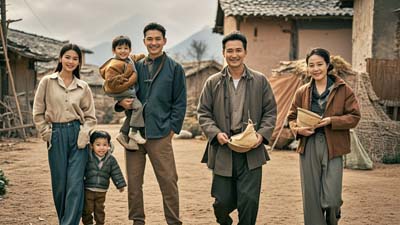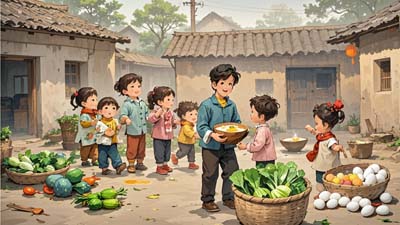
If you ask your Chinese friends what the hottest Chinese reality show is nowadays, they will probably answer, “爸爸去哪儿(Bàba Qù Nǎr) Where Are We Going, Dad?” The show features some of the most popular Chinese celebrities and their children, putting them to the test to see how or if they can handle various survival tasks in new environments. This popular program attracts viewers of all ages and undoubtedly has the highest current audience ratings of all the Chinese TV shows broadcasting at the same time. Let’s take a look at a few new, relevant phrases and hopefully get interested enough to check the show out for yourself!

Xīngbà
星爸
Celebrity father
“星(xīng)” means “star” and “爸(bà)” means “father”, so if we put them together, we get a celebrity dad. The five fathers who take part in “爸爸去哪儿(Bàba Qù Nǎr)” are by no means ordinary people. In fact, all of them are among the most outstanding and famous people in their respective fields. “杨威(Yáng Wēi)” is a former Olympic gymnast who was champion in the individual all-round and team all-round. “黄磊(Huáng Lěi)” and “陆毅(Lù Yì)” are both very famous mainland Chinese actors who have starred in many popular TV series. “曹格(Cáo gé) Gary Chaw” is a renowned Malaysian-Chinese singer-songwriter based in Taiwan. Finally, “吴镇宇(Wú Zhènyǔ) Francis Ng” is an outstanding Hong Kong actor and director. There’s no doubting that “星爸(xīngbà) celebrity father” is the perfect term to describe all five of these dads.
Example
Linda: Nǐ zuì xǐhuan Bàba Qù Nǎr lǐ de nǎ wèi xīngbà ne?
Linda: 你 最 喜欢 《爸爸去哪儿》 里 的 哪 位 星爸 呢?
Linda: Who is your favorite celebrity dad in Where Are We Going, Dad?
Mary: Wǒ zuì xǐhuan Lù Yì, yīnwèi tā hěn yōumò!
Mary: 我 最 喜欢 陆 毅,因为 他 很 幽默!
Mary: My favorite is Lu Yi because he’s really humorous!
Nǎibà
奶爸
Stay-at-home dad
Besides “星爸(xīngbà)”, all the fathers in “爸爸去哪儿(Bàba Qù Nǎr)” can be referred to by another Chinese name-“奶爸(nǎibà)”. What does it mean? The word “奶爸(nǎibà)” originated from the word “奶妈(nǎimā) wet nurse”. In ancient China, a “奶妈(nǎimā)” would have been hired to take care of and nurse a woman’s baby. Nowadays, with society becoming more equal among the sexes, more fathers have started taking up the responsibility of caring for their children. Such fathers are now called “奶爸(nǎibà) stay-at-home dad.” In “爸爸去哪儿(Bàba Qù Nǎr)”, the five dads and their children are sent to live in remote villages or places where the living conditions are harsh. Plus, the moms are not present. As a result, the five fathers have to take on all the responsibility of taking care of their children without any help from the kids’ mothers or nannies. Consequently, they are often referred to as “奶爸(nǎibà) stay-at-home dads” on the show.
Example
Zhè shì “nǎibà” Yáng Wēi dì yī cì gěi érzi zuòfàn.
这 是 “奶爸” 杨 威 第 一 次 给 儿子 做饭。
This is the first time that “stay-at-home dad” Yang Wei has cooked for his son.
Méngwá
萌娃
Innocent children
“萌(méng)” means “young and innocent” and “娃(wá)” refers to a “baby”. Although the fathers in “爸爸去哪儿(Bàba Qù Nǎr)” are very famous, they are not necessarily the leading roles in this reality show. In fact, the main characters of “爸爸去哪儿(Bàba Qù Nǎr)” are often those fathers’ lovely children. More often than not, the children of celebrities are brought up in very good conditions. However, in “爸爸去哪儿(Bàba Qù Nǎr)”, the five children have to adjust to living in poor conditions. Clean places to take a shower, exquisite food, and luxurious hotel suites with air-conditioning are nowhere to be seen on the show. Sometimes, they even have to handle tricky tasks by themselves such as asking strangers for vegetables or cooking egg soup for their dads. Although they are forced to grow up quickly and to become stronger and independent, viewers can still be amused by their innocent remarks and sweet faces.
Example
Bàba Qù Nǎr de wǔgè méngwá zhēnde hěn kě’ài!
《爸爸去哪儿》的 五个 萌娃 真的 很 可爱!
The five children in Where Are We Going, Dad? are very adorable!

1. Linda’s mother works very hard, so her father has taken on the job of raising Linda. Linda’s father is a ___.
A. 奶爸(nǎibà)
B. 奶妈(nǎimā)
C. 爸爸(bàba)
2. Which of the following characteristics does not describe a “萌娃(méngwá)”?
A. lovely
B. innocent
C. honest
3. Yang Wei, who appears in “爸爸去哪儿(Bàba Qù Nǎr)”, is a “星爸(xīngbà)”. What cannot be implied from this sentence?
A. Yang Wei is a star.
B. Yang Wei is already a father.
C. Yang Wei has a son.
Chinese for Kids
General Chinese (Beginner Level)
General Chinese (Intermediate Level)



